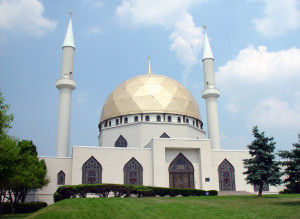
I was born in the United States, the last place a really strong practicing muslim would be, and yet after 10 years not setting foot there, I still found homely stories how it would feel when I was back in the US. This story I found in Huffington Post (mind the "divorce" section and go straight to the religious section). It reminded me the days in US and how we struggled to be a Muslim there, I thank you Brother Brandon G.Withrow for writing this and reminding me how home should really feel like. May Allah give you grace.
Last night I made my usual trek from Findlay, Ohio, where I teach seminarians and undergrad religious studies majors, to Perrysburg, about 35 minutes north. I moved with my wife to Perrysburg just under a year ago, a picturesque Midwestern town with parades for just about every occasion, no shortage of American flags, and a proud history of being the only other city platted by the U.S. government (Washington D.C. being the other, of course).
I'll be honest. Small-town living has been a bit of a re-adjustment for us. While both my wife and I were raised in the area, we left for the city life of Chicago more than 17 years ago and later spent several years in Philadelphia. It came as a shock when, during one of the worst economies in U.S. history, the school with the most immediate faculty opening after my doctoral graduation was smack in the middle of Ohio. I had fond memories of my childhood here, but I'd lived in big cities all of my adult life. In Philadelphia, almost all of the 11 neighbors in our apartment building were from other countries or ethnicities. We grew accustomed to the potent cacophony of scents that filled our hallway at dinnertime. Not so in Perrysburg.
The differences between Northwest Ohio and Chicago or Philadelphia go beyond Philly's pronunciation of water as "wooter" or the Chicago rendition of pop as "soda." In Chicago, we lived close enough to the projects to hear frequent gunfire. In contrast, the streets of uptown Perrysburg are the quaint home of the Thursday night farmer's market. It is the kind of place where you open your mail one day and read a note from your home's former owner: "Ran into neighbor Barb at the post-office. Congrats on the bathroom remodel!"
But this is not to suggest that Perrysburg lacks diversity. One of the most stunning sights in the area is on my route home from work. As one approaches our small town, there are two options: Route 23 or Interstate 75. If you take 23, you take mega-church alley, where large, unimaginative buildings shout Bible verses on scrolling electronic signs. However, opt for I-75 and you'll soon be dazzled by a beautiful mosque known as the Islamic Center of Greater Toledo. On a bright day you cannot miss the glow of its gold dome, flanked by twin minarets. And at night, soft lights illuminate huge stained-glass windows. It is a work of art I get to enjoy with every trip home.
The Center, the fruits of the labor of Syrian and Lebanese immigrants to Toledo, was the third mosque to be founded in America. It serves not only as a place of worship for Muslims of two-dozen nationalities, but as a place of social action and interfaith discussions.
It also adds a bit of good, old-fashioned competition to the region.
Immediately after our Midwestern mosque is an exit decked with signage demanding that I spend my money at Burger King, MacDonald's, Bob Evans, Panera or Chili's. They all compete with one another and, hey, that's America. So what could be more American than this gorgeous mosque competing for religious space with the local mega-churches and even my little Episcopalian congregation just a mile and a half away?
But the mosque also has a personal association for me. When I'm teaching late, my wife asks me to let her know when I'm getting close to home. The mosque is almost exactly 10 minutes from our driveway and is therefore a convenient marker. In the car I pull out my Android phone and give it a voice command to text her just one word: "mosque."
After the first few times I did this, I realized that the sight of the mosque triggers an association with "home." Knowing I'm almost home is a great feeling: it's my place of refuge; it's where I spend time with the most important person in my life; it's where I enjoy good conversation, good wine and good books. So if someone were to remove the mosque, something of "almost home" would go with it.
Last Thanksgiving, this possibility was brought to light when the mosque in Corvallis, Ore., where Mohamed Osman Mohamud (the thwarted car bomber) attended, was fire-bombed. This act of terrorism against the mosque only highlights the continuing hate that some have for their American Muslim neighbors. During the height of the New York "mosque controversy," some of my conservative friends suggested all sorts of nefarious and conspiratorial connections that "our" mosque could have. One person even went so far as to say that the minarets were hiding missiles.
Fear will always find a way to perpetuate itself. Unfortunately, whether one is in New York, Tennessee, Oregon or Ohio, to hate-blinded people a mosque can mean only terrorism. I doubt this attitude will disappear anytime soon. But I am happy to say that, of all the things (good or bad) our local mosque may represent to my neighbors, for me it means I'm almost home.
No comments:
Post a Comment